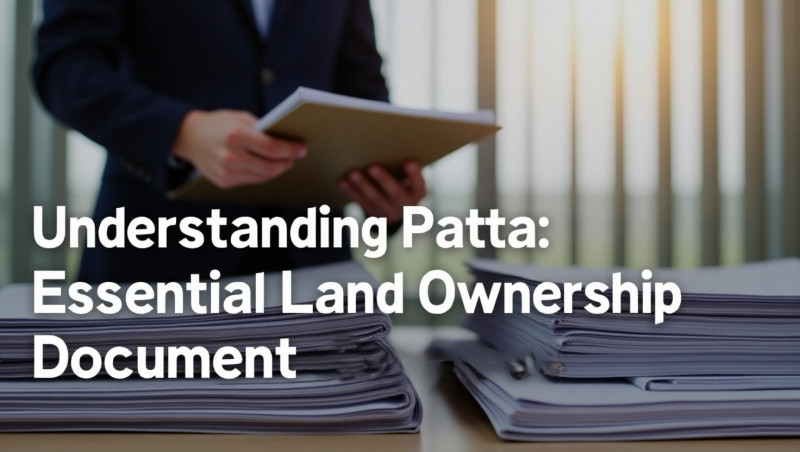- May 09, 2025
-
Understanding Patta: Your Essential Land Ownership Document
When it comes to land ownership in India, one document that often slips under the radar—but shouldn’t—is the Patta. While most people are aware of the Sale Deed or the Encumbrance Certificate, very few understand how important a Patta is in proving and protecting your property rights.
Whether you're buying land, inheriting it, or trying to resolve a dispute, this small but mighty paper issued by the Revenue Department plays a big legal role. So, let’s break it down, nice and easy.
1️⃣ What Is a Patta?
A Patta is a legal ownership document issued by the Revenue Department of the Tamil Nadu government (and equivalent departments in other states). It’s basically your proof of "this land is officially mine" in government records.
A Patta Includes:
- ✅ Name of the landowner
- ✅ Survey number of the land
- ✅ Extent/area of the property
- ✅ Land classification – residential, agricultural, commercial
- ✅ Details of past ownership (if any)
🧠 Think of it as your land’s identity card, registered in your name and backed by government records.
2️⃣ Why Is a Patta So Important?
Let’s say you bought land and got the Sale Deed registered. Great! But without a Patta, your name isn’t updated in the revenue records—which means the government still sees someone else as the owner.
Here’s why that’s risky:
- ❌ Can’t prove ownership in court without a Patta
- ❌ Tough to sell or resell the land
- ❌ Risk of land acquisition without proper compensation
- ❌ More prone to encroachments or illegal possession
✅ With a Patta in your name, you can confidently say: “This land is legally mine—and I can prove it.”
3️⃣ How to Apply for a Patta: Step-by-Step
Getting a Patta isn’t rocket science—but it does involve a bit of paperwork and a verification process.
Here's how it works:
🏢 Offline Process:
- Visit your local Taluk or Revenue Department office
- Submit: Sale Deed copy, Encumbrance Certificate (EC), Proof of identity (Aadhaar, PAN), Tax receipts if available
- Fill out the Patta application form
- The Revenue Inspector will inspect the property
- Once verified, Patta is issued in your name
💻 Online Process
(Available in many states like Tamil Nadu):
- Visit eservices.tn.gov.in
- Select “Apply for Patta”
- Upload scanned copies of: Sale Deed, EC, ID Proof
- Submit and track status online
- Download once approved
⏳ Timeframe: It may take a few weeks depending on the local office’s workload and verification.
4️⃣ Revenue vs. Registration Department
Confused between the Registration Department and the Revenue Department? You’re not alone. Here's how it works:
📑 Registration Department:
- Handles property transactions
- Registers your Sale Deed
- Ensures legal transfer of property title
🏛️ Revenue Department:
- Maintains land ownership records
- Issues Patta, Adangal, FMB Sketch
- Updates changes in land ownership in government records
✅ To complete your land ownership process, both departments must work in sync—register the sale and then get the Patta.
5️⃣ Key Questions to Ask When Buying Land
Before closing a land deal, never hesitate to ask these two simple questions:
❓ “Does the land have a Patta?”
If yes, make sure it matches the seller's name. If no, push for it before you buy.
❓ “Is the Patta updated in the current owner’s name?”
If it's still in the previous owner's name, get it corrected before registration.
Documents Often Required for Patta Application
FAQs
Q1: Is Patta mandatory for all properties?
Yes, especially for plots, agricultural lands, and independent houses. For apartments, the land will have a joint Patta in the name of the builder or association.
Q2: Can land be sold without a Patta?
Technically yes, if the Sale Deed is clear. But without a Patta, buyers will face issues getting utilities or securing legal rights later.
Q3: How long is a Patta valid?
Once issued, a Patta remains valid unless ownership changes. However, it’s good practice to update or renew it when there's a legal change in ownership.
Q4: What’s the difference between Patta and Title Deed?
- Patta = Revenue record of land ownership
- Title Deed (Sale Deed) = Legal proof of ownership transfer between two parties
Final Thoughts: Patta = Power
In the world of land ownership, a Patta isn’t optional—it’s essential. It’s the document that turns your property into a secure, legal, government-recognized asset.
So whether you’re buying, selling, or simply securing your family's land, make Patta your priority. It’ll save you stress, time, and a whole lot of money in the long run.


Comments :
Currently, there are no comments in this post. Be the first person to comment on this post.